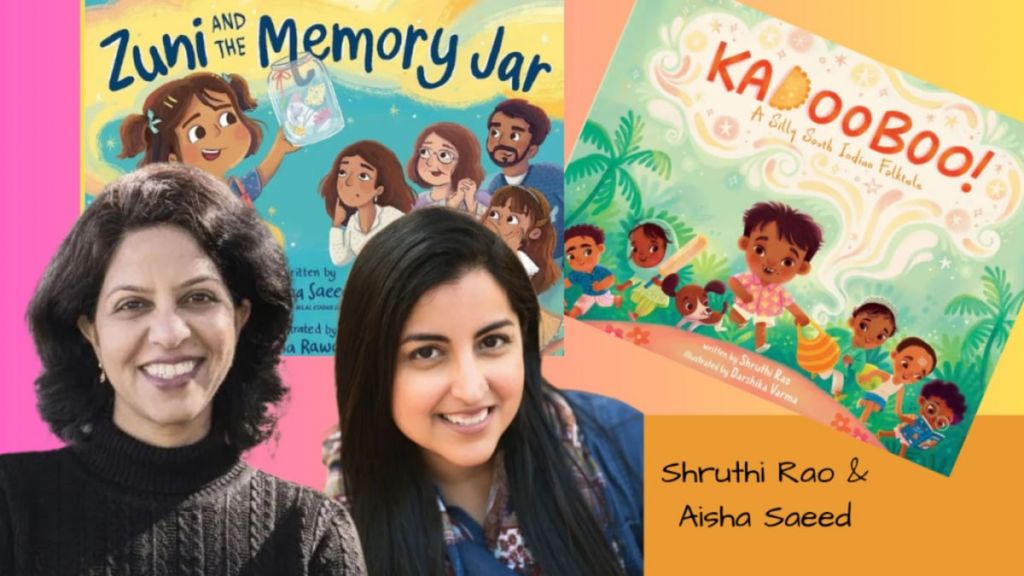
Shruti Rao’s books for children: As an Indian immigrant mom to first-generation Indian American boys growing up in Seattle, I’m always delighted to chance upon books representing our desi children. This is a trend that’s growing thanks to noteworthy contributions by authors like Shruthi Rao and Aisha Saeed.
Kadooboo! A Silly South Indian Folktale
Former IT professional, Shruthi Rao has authored over a dozen children’s books. Her most recent one is Kadooboo! A Silly South Indian Folktale. The folktale this book brings to life is one that Rao heard from her grandmother about a man hurrying home to tell his wife about a delicious treat he ate, called the kadooboo. Along the way, he trips and falls, and in the confusion mixes up the name of the sweet to doobookoo.

Intrigued by this simple and entertaining story, Rao’s penchant for children’s writing transformed it into a funny, endearingly silly, child-friendly version. It is a comical narrative about a little boy, Kabir, whose encounters on his way home influence the mix-ups of the name. Undoubtedly, Darshika Varma’s vivid and humorous illustrations bring life into the story.
Shruti Rao: Children’s fiction and non-fiction
Rao’s writings, both fiction and non-fiction, are varied. Malhar In The Middle, for instance, is about a child tabla player who wants to occupy center stage, and Susie Will Not Speak, is about a little girl who’s conscious of her lisp. In her non-fiction work, Rao brings forth her background and interest in STEM topics. Spaceship To The Universe; How We Know What We Know; Ten Indian Women Who Were the First To Do What They Did; and Twenty Indians Who Changed The World are some of her non-fiction books. The latter two books are stories about ground-breaking but lesser-known “firsts” accomplished by Indian men and women.
Themes drawn from everyday life
As an experiential writer, Rao sees potential book ideas in her day-to-day life, drawing inspiration from travel, conversations, and even television shows. Her writing philosophy is clear in her impressive collection of children’s books. In her words, “I like and appreciate it when a book is easy to read, no matter how complicated the subject is and how complex the characters, concept, or plot. It’s hard work to produce writing that flows effortlessly. But it’s priceless, both for the reader and the writer.”
Zuni and the Memory Jar
Aisha Saeed is a Pakistani American author who has penned well-known books such as Written in the Stars; New York Times Bestseller, Amal Unbound; Omar Rising, and Bilal Cooks Daal, among others.

The protagonists in her impressive cornucopia of writing are, of course, South Asian teens and children. Saeed’s latest children’s book Zuni and the Memory Jar, published earlier this year, is a delightful story about a little girl, Zuni, who teaches us that “Remembering is how we make memories…(so), bottle your special ones,” and that life’s small moments are indeed the sweetest of them all.
A jar full of family memories
The plot is simple. When little Zuni’s family decides to create a memory jar to write and store the year’s memorable moments, she’s at a loss. While Zuni’s older siblings’ list is replete with big celebratory moments like winning soccer games and medals, successful piano recitals, etc. she starts to recount the small moments in her life that brought her joy. Like when she splashed in the fountain or when she helped her Nani (maternal grandmother) bake a strawberry cake. In a competitive society where achievements in the form of trophies and winning are highly valued and remembered, Zuni cheerfully reminds us that the smaller day-to-day human moments are often the most gratifying. Once again, to give credit where it’s due, it’s illustrator Neha Rawat’s magic that truly brings Zuni’s narrative to life!
Personal and candid reflections
Like most poignant stories, Saeed’s are deeply personal and candid reflections of her and her family’s personal experiences. And that takes a fair amount of eloquence as well as a dollop of courage! Bilal Cooks Daal, for instance, was inspired by her family’s love for slow-cooking daal (lentils) and the joy of sharing food with the community. The Together Tree is a story about bullying which was unfortunately derived from personal experiences as well within her family.
Zuni and the Memory Jar is also a story from her own family. Just like Zuni’s family, Saeed’s family too has a memory jar to keep and collect memories that they share at different times of the year to remember and reflect. In her own words, Saeed’s “favorite part of being a writer is connecting with my readers…to write the best stories I can that will transport my readers and entertain them and touch them.” This sentiment certainly shines through in her works!
As I better acquaint myself with the books written by these two prolific desi women authors, I feel a certain gratitude towards them. Their invaluable collection of children’s books representing our own desi children helps them make sense of their place in America and globally, showing them a world where they can see themselves in the pages of books they read.
(The article is published under a mutual content partnership arrangement between The Free Press Journal and India Currents).